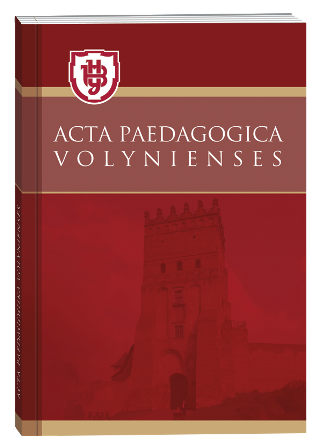DEVELOPMENT OF PRESCHOOLERS WITH INTELLECTUAL DISABILITIES: THE COMMUNICATIVE ASPECT
DOI:
https://doi.org/10.32782/apv/2024.5.3Keywords:
communication, communicative activity, intellectual disabilities, intellectual developmental disorders, preschoolers, developmentAbstract
The article examines the features of communicative activity in preschoolers during ontogenesis and in cases of intellectual developmental disorders. It identifies that the prerequisites for communicative development include the formation of self-awareness, the need for communication, and new forms of interaction, particularly those that are extra-situational and personal. Based on research by scholars, it is noted that the criteria for the development of communicative and speech abilities in preschoolers include: the stability of motivation for interaction with adults and peers; initiative in interactions; the ability to independently establish contacts; active participation in interactions with the environment; the ability to deeply perceive the content of conversations on a personal level; and an emotionalevaluative attitude toward communication. Specific traits of communicative activity development in preschoolers with intellectual disabilities are highlighted. A unique feature of interpersonal contacts among children with intellectual disabilities lies in their irregularity and unconventionality. The lack of coordination in communicative actions often leads to conflicts and protests. The forms of communication among preschoolers are described as emotional-practical and situational-businesslike. It is emphasized that children with intellectual disabilities retain the need for communication entirely, but the finer aspects of communication methods are underdeveloped. The psychological development of these children exhibits certain characteristics influenced by the peculiarities of their mental processes. The slower progression of cognitive processes affects speech development. Everyday conversational speech is poorly developed, which limits the child’s participation in discussions and communication. It is underlined that the development of communication skills in children with intellectual disabilities occurs through speech activities, speech perception, and speaking. Creating the necessary conditions for successful speech activities and communication is crucial for these children. The formation of full-fledged speech is ensured by conditions such as having content to express, a need for communication, an internal stimulus to speak, a desire to convey one’s own ideas, and the provision of necessary linguistic tools for children’s expressions.
References
Боряк О. В. Методика логопедичного обстеження розумово відсталих дітей старшого дошкільного та молодшого шкільного віку / за заг. ред.: Т. М. Дегтяренко. Суми: ВВП «Мрія», 2015. С. 133–152.
Кірєєва О. О. Мовленнєво-ігрова діяльність як ефективний засіб розвитку зв’язного мовлення дітей старшого дошкільного віку. Наука, освіта, суспільство очима молодих : матеріали Х міжнар. наук.-практ. конф., 17 травня, 2017 р. Рівне, 2017. С. 66–68.
Корніяка О.М. Психологія комунікативної культури школяра: монографія. К., 2006. 306 с.
Кузава І. Б. Інклюзивна освіта дітей дошкільного віку: монографія. Луцьк : ПП Іванюк В. П., 2020. 345 с.
Мартиненко І. В. Психологічні засади формування комунікативної діяльності дітей старшого дошкільного віку з системними порушеннями мовлення : дис. … д-ра психол. наук. Київ, 2017. 500 с.
Омельченко І. М. Технологія формування спілкування дітей із затримкою психічного розвитку : навч.-метод. посіб. Полтава : Техсервіс, 2017. 133 с.
Піроженко Т.О. Комунікативно-мовленнєвий розвиток дошкільника. Тернопіль: Мандрівець, 2010. 152 с.







